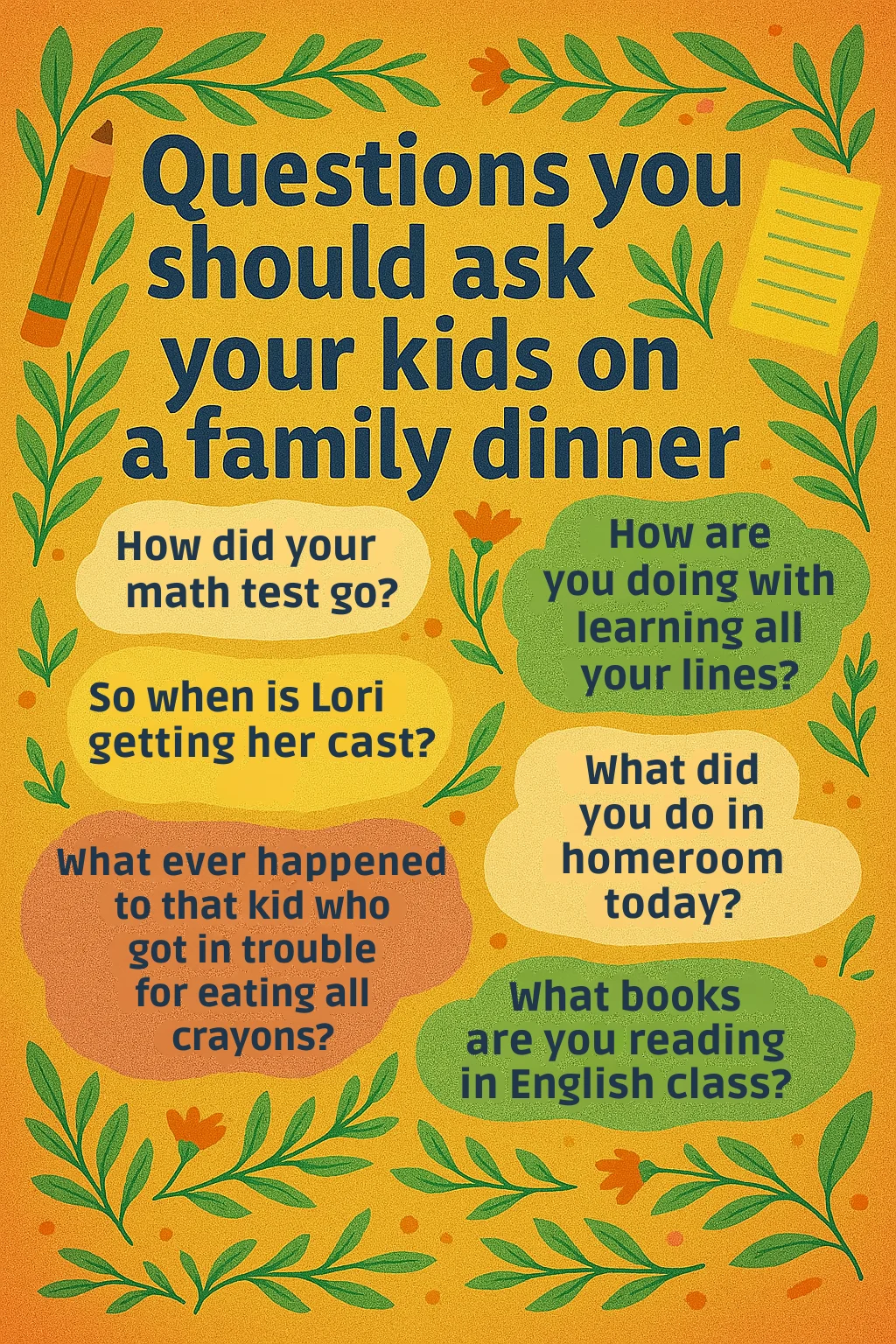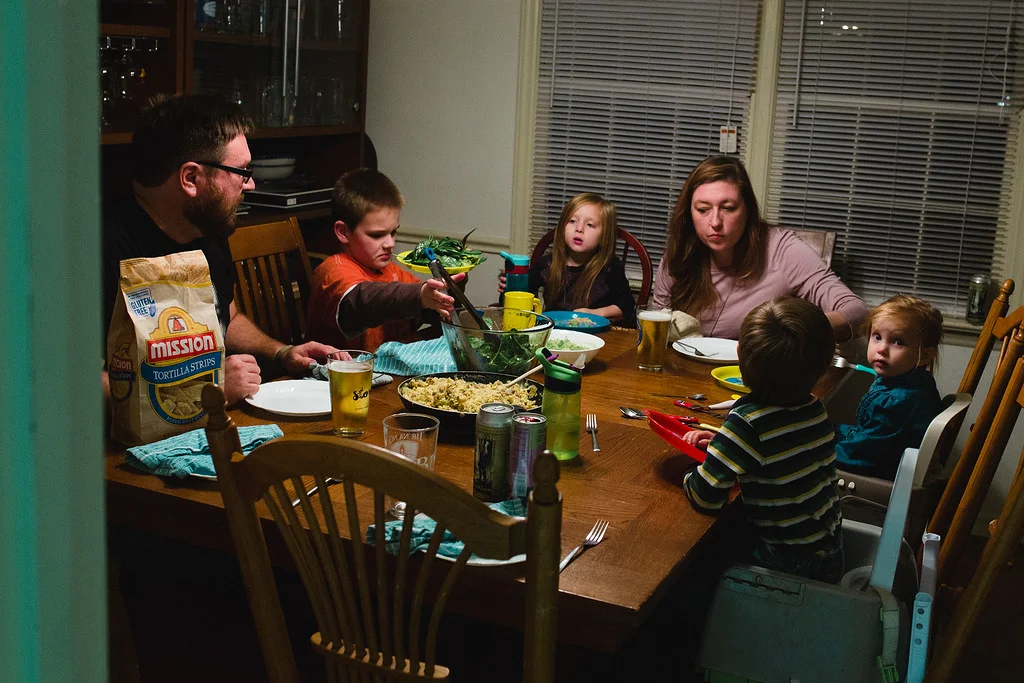The Benefits and Importance of Family Dinners
- Raffi Bilek

- Mar 27, 2025
- 7 min read
Updated: Jul 24, 2025

Thinking about starting a family meal tradition in your home? Or trying to make the one you already have work a little bit better? You’ve probably heard all kinds of family dinner statistics – the impact of family dinners on mental health, the correlation between family dinners and academic performance, and so on.
There are certainly a lot of benefits to eating together regularly as a family. But you may have discovered that getting it to happen isn’t as easy as they make it look on TV! Let’s do a quick review of some of the reasons it’s worth the effort, and then we’ll dig into some tips for getting there.
Benefits of Family Dinners
It’s been known for some time now that eating dinner together as a family provides a wealth of benefits to children, some of them quite unexpected. It probably goes without saying that it strengthens family ties and improves family functioning and closeness overall. But there are numerous other benefits beyond the boundaries of the family, too.
Here’s a few of the top perks:
Better mental health
Children who sit down to eat with their family on a regular basis are better protected from a range of mental health concerns, including depression anxiety, suicidality, and more. This shouldn’t come as a surprise – a small daily event where kids get a sense of connection and belonging is a clear buffer against the stresses of the world out there.
Lower rate of substance use and other risky behaviors
Similarly, family mealtime appears to reduce the risk of kids (mis)using alcohol, tobacco, and other drugs, as well as engaging in unsafe sexual behaviors and teen pregnancy. It seems that supporting the family unit in this way provides protection against peer influences that tend towards such risky behaviors. In fact, the more days per week family dinner takes place, the less likely it is that kids will engage in those behaviors!
Better academic performance
Kids who have regular family meals even demonstrate better academic performance – i.e., higher grade point averages as well as stronger commitment to learning. This perk is perhaps more surprising than others; even when you take into account various family factors, the effect is still there. That is to say, you don’t even have to talk about the important of getting good grades at dinner for dinner to produce better grades!
This a just brief rundown of some of the top family mealtime benefits. There’s plenty of research out there for you if you’re interested! Let’s shift focus now to how to make family dinner actually happen.
Making Family Dinner Happen
If family dinner has not been the norm until now in your family, making the transition will be a bit tricky, but certainly not impossible. All transitions are difficult; this one is no different.
Start by telling your children that you’re planning to give this new idea a shot. Skip the list of benefits; odds are your kids won’t care that much (unless perhaps they are super motivated to get good grades). If you get pushback, just let them know it’s something you’re going to try for 2 weeks (or somewhere around there) and then reevaluate. Don’t get dragged into a debate about it.

To get more buy-in, try letting every kid choose the menu for one dinner a week. (If you have more than 7 kids, well… good luck to you!) For the other meals, it’s a good idea to plan ahead and have the needed ingredients for your meals; last-minute scrambling and half-baked dinner menus won’t get you a lot of family dinner fans. Pick things you know your kids like – or at least, some of your kids. If you have more than 1, odds are you’ve already discovered plenty of foods that one will eat that other simply won’t.
To deal with such discrepancies, have easy backups on hand – PB&J is always great, or noodles, or whatever your kids will eat that you can easily throw together if they refuse to eat what’s on the menu that night. (For kids that are old enough to make it themselves, that should be the expectation – if Jimmy doesn’t want to eat what’s been made, he can make himself something else from a pre-approved list.)
Making Family Dinner Enjoyable
Naturally, family dinners are only going to work if people enjoy it. If it’s miserable for your family members, it’s going to fall apart pretty quickly.
Getting people involved in menu planning is a good way to get some buy-in for the meals. It may also pique people’s interest to try new dishes and cuisines, or to make food fun with fun shapes, faces, colors, etc. A good dessert option, if that fits with your family’s approach to health and nutrition, is a good motivator as well!

Getting kids involved in cooking the meal can also be fun (mostly for younger kids, or for older ones who enjoy cooking). The goal here would not be to teach them responsibility (though that’s a nice by-product), but rather to give them the chance to feel “big,” express their creativity, or simply have some one-on-one time with Mom or Dad in the kitchen.
Some advance planning will also help with the part where you actually sit down to dinner. If all that people say is, “How was your day today?” “Good” – it will quickly become pretty boring. Instead, try to prepare some family dinner conversation topics by noting anything from your day that might be worth sharing. You might think that nothing noteworthy happens to you at work. But for kids, who only have school as a framework of reference, lots of things can be interested and entertaining.
For example, today (on the day I am writing this post!), my car refused to start and it had to be towed to the mechanic. I also got an email addressed, “Hi (Canidate Name),” (yes, with that typo). These are things that might seem routine or totally trivial, but I am pretty confident they’ll make for good stories for my kids tonight!
Think of things you experienced today that might not be the norm for a kid and see how it goes to share it. You can also talk about interesting issues in current events (though politics these days can drive anyone crazy).
Questions you should ask your kids
On the flip side, think of questions to ask your children besides “how was your day?” Hopefully you have some sense of what’s going on in their lives. Have they been studying for a test? Worried about a performance? Here’s an assortment of questions that might be relevant to you or provide some ideas for ones that are:
How did your math test go?
How are you doing with learning all your lines?
So when is Lori getting her cast off?
What ever happened to that kid who got in trouble for eating all the crayons?
What did you do in homeroom today?
What book are you reading in English class?
What’s the latest on the feud between Jackson and Joey?

If you ask generic questions, you’re going to get generic answers. Be creative, and be specific to them; you’ll get more of a response that way. Then listen to the answers! Kids who are listened to want to talk.
Set Realistic Expectations
Family dinner success does not mean family dinner perfection. I can assure you that your family meals will not run as smoothly as they do in your average sitcom. Expect a little bit of chaos. Definitely expect some sass from teenagers and some obnoxious comments between siblings.

Note that dinner is not the time to lecture about fighting, kind words, etc. It’s supposed to be a positive time for everyone to the extent possible. When negative behaviors pop up, try to redirect the conversation. Deal with the behavior later if need be.
Also, don’t be too rigid about it in general. It’s great to have a regular dinner time for your family; but insisting on starting on time, to the minute, every day will drive your kids (and probably your spouse) crazy. There needs to be some flexibility there.
Likewise, it’s good to have a degree of flexibility about attendance. Not that family dinner should be optional; it should be an expectation. The way I frame it for my children is that we expect them to come. If they refuse to come on any given day, we invite and encourage them to join; we do not let go of the expectation, but we don’t force them to come or punish them for not coming. They just have to live knowing they are not doing what is expected of them. (This touches on a much larger issue of discipline in general. My approach, in a very tiny nutshell, is that the relationship you have with your kids is the best motivator – far more than punishments or sticker charts. More on this another time.)

This is especially needed with a moody teenager, a kid having a tantrum, or someone who just needs some space tonight. If the expectation is there, and you issue an invitation every night, then if they skip out on family dinner every now and then, it’s something you can allow without giving the whole thing up.
If at First You Don’t Succeed…
As we noted above, the benefits of family dinners are many, and they are worth the effort. Don’t give up if it flops at first. Anything worthwhile is going to take time and effort. Know that you are doing your children a favor by implementing this, and be ready to remain flexible as you try to make it work.
And of course, if you need help managing your family – for dinnertime or any time – reach out to us and we’ll be here to help!
Strengthen Your Family Bonds
Explore simple strategies to make family dinners a staple in your home and reap the rewards of closeness and improved behavior.




Comments